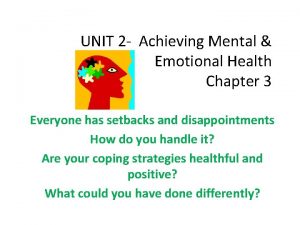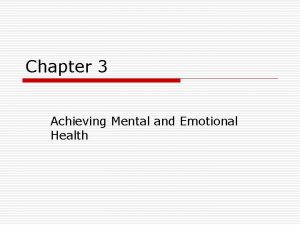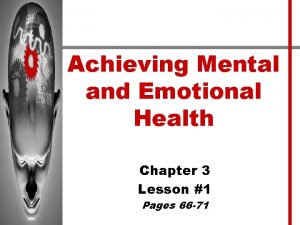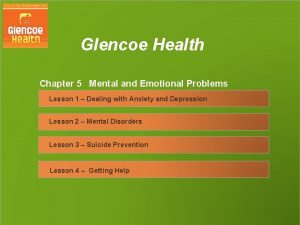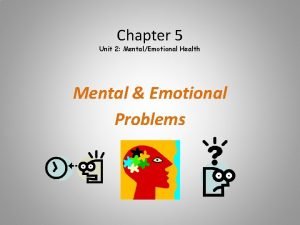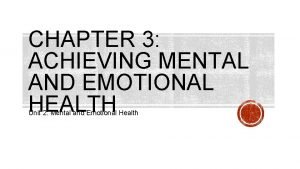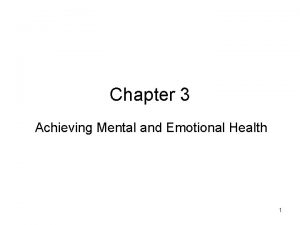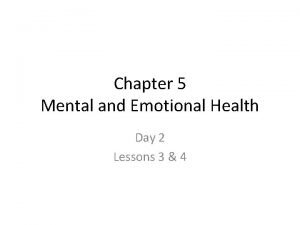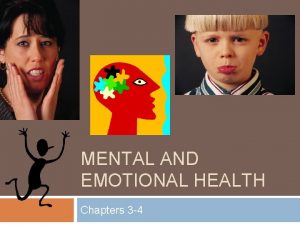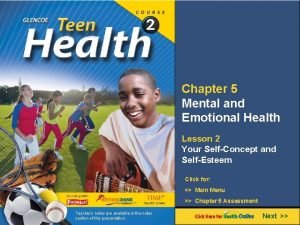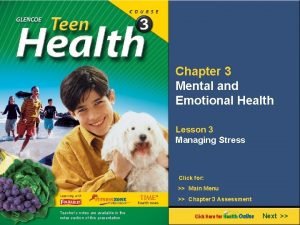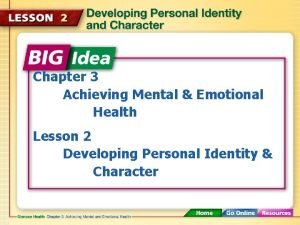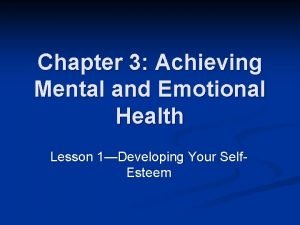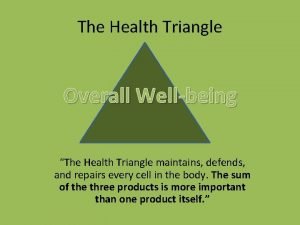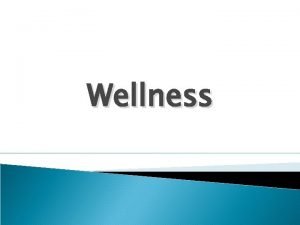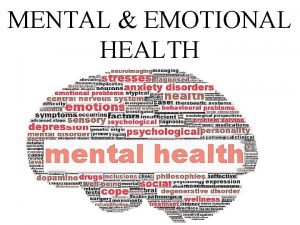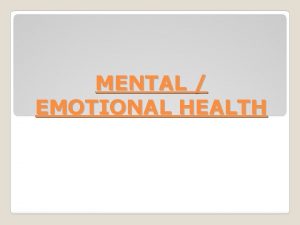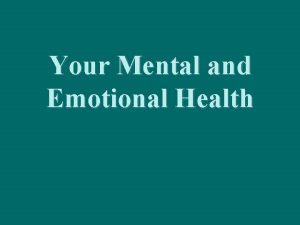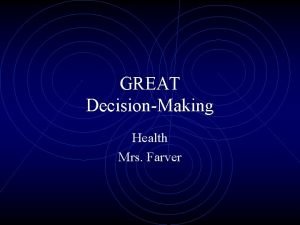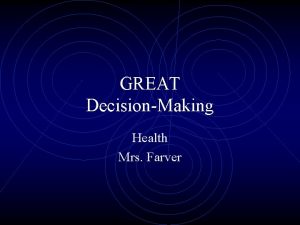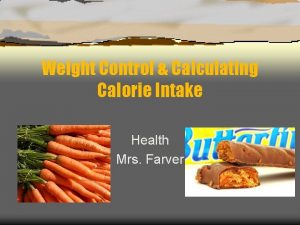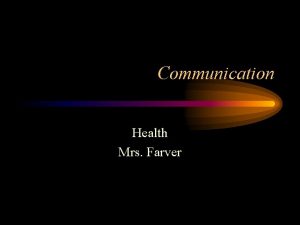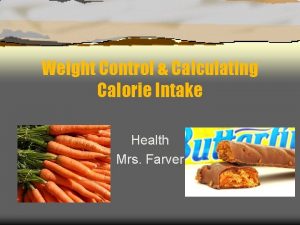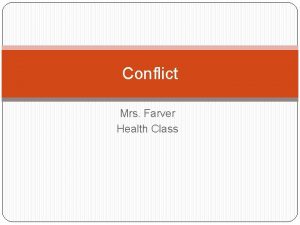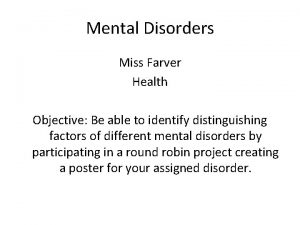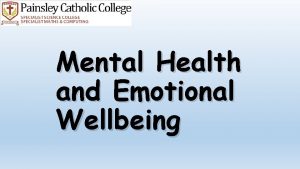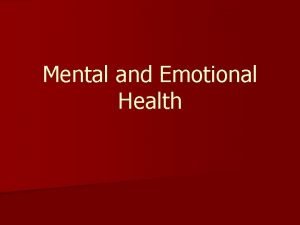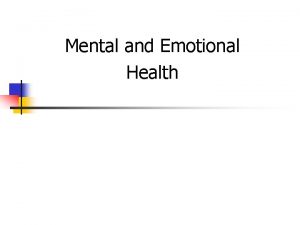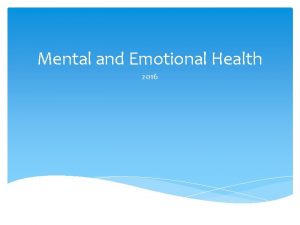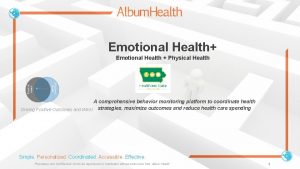Mental and Emotional Health Mrs Farver Mental Health




















- Slides: 20

Mental and Emotional Health Mrs. Farver

Mental Health - definition �Mental Health – reflects a person’s ability to cope with the daily demands of life (i. e. deal with stress), have a positive self-concept, and be free from mental illness.

Emotional Health - definition �Emotional Health – reflects a person’s ability to express all emotions in a positive way, and be able to talk about emotions and ask for help when needed.

What is Self-Concept / Self. Esteem? �Self-Esteem: is a measure of how much you value, respect, and feel confident about yourself.

Benefits of High Self-Esteem � 1. Increased Respect: ◦ Respect themselves ◦ Take care of themselves ◦ Respect their personal values, as well as the values of others ◦ They will not pressure others to participate in risky behavior � 2. Increased ability to reach goals: ◦ You’re more likely to set realistic goals for yourself ◦ More likely to stick with your goals ◦ More likely to achieve their goals due to effort

Benefits of High Self-Esteem Continued � 3. Increased willingness to try: ◦ Have the will to try new things ◦ Don’t get discouraged easily � 4. Increased feelings of value: ◦ Feel they are valuable to family, school, and the community ◦ More likely to ask for help when needed ◦ More likely to volunteer and help others

Risks of Low Self-Esteem � Vulnerable to peer pressure � Lack of respect for self and others � Makes risky behavior decisions � More at risk for depression and suicide � Often have poor mental health � More critical of themselves and others

Characteristics of High vs. Low � High ◦ ◦ ◦ ◦ Self-Esteem: Speaks up for self Respects self and others Has confidence Tries new things Feels valuable to society Adjusts to change Feels optimistic Makes decisions based on values � Low Self-Esteem: ◦ Feels insecure ◦ Disrespects self and others ◦ Vulnerable to peer pressure ◦ Doesn’t feel valuable ◦ Feels depressed ◦ Fears failure ◦ Uses drugs and alcohol ◦ Feels pessimistic ◦ Behaves destructively

Improve your self esteem � 1. Use Positive Self-Talk ◦ The things you say to yourself strongly affects the way you see yourself ◦ We are constantly talking to ourselves, whether we realize it or not ◦ Self-talk = coaching yourself about your own self-worth. ◦ Tell yourself you’re valuable. Tell yourself your worth it. Tell yourself you can do what you set out to do. � 2. Act with integrity: ◦ Integrity is the characteristic of doing what one knows is right. ◦ Live by the values and beliefs you believe in.

Improve your self-esteem (cont) � 3. Choose supportive friends: ◦ It’s easier to treat yourself well if the people you know also speak well of you. ◦ Avoid critical, disrespectful people. � 4. Accept yourself: ◦ People with high selfesteem do not think they are perfect. ◦ They see all their imperfections and still think of themselves as valuable.

Stress Defined � STRESS = The body’s and mind’s response to a demand � STRESSOR = situation or thing that puts a demand on the body or mind (the thing that causes the stress)

Eustress vs. Distress � Eustress = Positive ◦ Energizes and helps you reach a goal or accomplish something ◦ Examples: �Getting married �Having a baby �Starting a new job � Distress = Negative ◦ Makes one sick or prevents one from accomplishing a goal ◦ Examples: �Giving a speech �Problem �Guilty

Types of Stressors � Environmental Stressors: ◦ Examples: pollution, poverty, crowding, noise, natural disasters, etc. � Biological Stressors: ◦ Examples: illness, disability, injury, etc.

Types of Stressors Continued � Thinking Stressors: ◦ Any mental challenge, ex: test � Behavioral Stressors: ◦ Examples: using tobacco, alcohol, poor timemanagement, or anything that put stress on your body � Life Change Stressors: ◦ Examples: death of a loved one, getting married, moving, etc.

Responding to stress - 3 Stages 1. Alarm – Body and mind go into high alert and the hormone adrenaline is produced and released into the body. This produces the fight or flight response. �Breathing speeds up �Heart beats faster �Muscles tense �Pupils dilate �Digestion slows �Blood sugar increases

3 stages of stress response continued 2. Resistance – Make the decision for fight or flight. You are resisting the stress in this stage. ◦ Endurance levels rise for a period of time and can produce extra strength, speed, etc

3 stages of stress response continued 3. Fatigue – after prolonged exposure to the stressor the body loses the ability to adapt and a tired feeling takes over. Three types of fatigue set in: ◦ Physical – weak and tired muscles causing soreness ◦ Psychological – feeling overwhelmed, worried, depressed ◦ Pathological – body has trouble fighting off illness due to weakening of immune system

Chronic Stress � Chronic Stress = long-term stress with no relief (very bad) Can lead to depression and other illness ◦ Alarm Stage = become alert ◦ Resistance Stage = eventually become unable to resist disease ◦ Exhaustion Stage = body can’t handle resistance anymore, organs and immune system suffer

Dealing with Stress � Take care of yourself! � Exercise regularly or do something you enjoy � Get enough rest � Eat right � Learn to relax ◦ Breathing exercises ◦ Tension-releasing exercises � Manage your time � Change your attitude – positive thoughts � Develop resiliency – ability to bounce back from stress

Developing Resiliency � Develop your assets: ◦ Know when to ask for support ◦ Empowerment ◦ Set Boundaries ◦ Productive use of time ◦ Commitment to learning ◦ Positive values ◦ Positive Social skills ◦ Positive identity
 Chapter 3 lesson 3 expressing emotions in healthful ways
Chapter 3 lesson 3 expressing emotions in healthful ways Chapter 3 achieving mental and emotional health
Chapter 3 achieving mental and emotional health Chapter 3 mental and emotional health answer key
Chapter 3 mental and emotional health answer key Chapter 5 lesson 3 health
Chapter 5 lesson 3 health Chapter 5 lesson 4 mental and emotional problems
Chapter 5 lesson 4 mental and emotional problems Chapter 15 achieving mental and emotional health answer key
Chapter 15 achieving mental and emotional health answer key Chapter 3 achieving mental and emotional health
Chapter 3 achieving mental and emotional health Emotional health defintion
Emotional health defintion Achieving mental and emotional health
Achieving mental and emotional health Chapter 3 mental and emotional health
Chapter 3 mental and emotional health Chapter 3 achieving mental and emotional health
Chapter 3 achieving mental and emotional health Chapter 3 achieving mental and emotional health
Chapter 3 achieving mental and emotional health Chapter 3 lesson 2 health
Chapter 3 lesson 2 health Chapter 3 achieving mental and emotional health
Chapter 3 achieving mental and emotional health Chapter 15 achieving mental and emotional health
Chapter 15 achieving mental and emotional health Well being triangle
Well being triangle Mental emotional health
Mental emotional health They are mrs garcia and mrs castro
They are mrs garcia and mrs castro They are mrs garcia and mrs castro
They are mrs garcia and mrs castro Baguakortet
Baguakortet Skibslys test
Skibslys test
